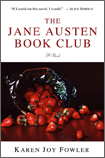- Categories:
The Perfect Book Club
Novelist Karen Joy Fowler "cannot fix on the hour, or the spot, or the look, or the words, which laid the foundation" of her love for Jane Austen's novels. Like many other writers she has a hundred reasons for loving Austen, but she particularly responds to the power and invention of Austen's narrative voice.
 Since the publication of Fowler's first novel, Sarah Canary (Ballantine), in 1991, her own distinctive narrative voice has been attracting devoted fans. In 2002, her novel Sister Noon (Plume) was nominated for the PEN/Faulkner Award. And with Putnam's publication of her latest novel, The Jane Austen Book Club, scheduled for this month, Fowler expects to be visiting many book clubs and bookstores across the country in support of it.
Since the publication of Fowler's first novel, Sarah Canary (Ballantine), in 1991, her own distinctive narrative voice has been attracting devoted fans. In 2002, her novel Sister Noon (Plume) was nominated for the PEN/Faulkner Award. And with Putnam's publication of her latest novel, The Jane Austen Book Club, scheduled for this month, Fowler expects to be visiting many book clubs and bookstores across the country in support of it.
In The Jane Austen Book Club five women and one man form a monthly book club to read Austen's six complete novels. The idea for the novel came to Fowler after a reading by Carter Scholz (Radiance, Picador) at Book Passage in Corte Madera, California. Book Passage had a sign posted for "The Jane Austen Book Club," which Fowler briefly imagined was a book. However, by the time she had gotten out her wallet, she'd realized that it was an actual book club. Disappointed, she decided then and there -- even though she was in the middle of researching her next novel -- that she would drop everything and write the story of the Jane Austen Book Club herself.
"On the way home," she told BTW from her home in Davis, California, "on the Richmond Bridge, I came up with the structure of six people, six meetings, six chapters, six Austen novels." And the special beauty of this plan was that it required her to reread all of Austen "before I even began to write. That was the smart part."
In addition to rereading Austen's works, Fowler had accumulated valuable research for this book during her involvement, for a number of years, helping to run a book club at The Avid Reader in Davis, California. As she pointed out, there are many advantages for writers in book clubs: First, there is getting together with people to whom books matter so much on a monthly basis. And, second, Fowler said, "I have a professional interest in seeing how different the same book can look to different readers. It happens every month, and it never ceases to surprise me." In her book club, she has read books that she might never have chosen -- and ended up loving them, including Plainsong by Kent Haruf (Vintage), Fingersmith by Sarah Waters (Riverhead), and Morality Play by Barry Unsworth (Norton).
Invitations to book clubs are Fowler's favorite kind of public appearance. And, here, Fowler delved into one of the great mysteries of book clubs: the frequent lack of men. "There has never," she said, "been an exception to this rule. Our book club occasionally tries to hook a few. We bait with Elmore Leonard, Carl Hiaasen, and military nonfiction. But they are too wily for us." She did offer one thought: "I wonder if more men would join book clubs if they understood how outstanding the food generally is?"
One of the most memorable book clubs Fowler has visited was one in Turlock, California, which has been going for almost 70 years. Mothers pass their memberships on to their daughters. Although these two facts may not be related, she pointed out that "it was one of the dressier clubs I ever went to."
Since women are the backbone and mainstay of book clubs, it makes sense that in The Jane Austen Book Club there are five women and only one man. That two of the characters, Sylvia and Allegra, are mother and daughter, only adds to the internal tensions. Their relationship was partly based on Fowler's relationship with her adult daughter, a marine biologist who works part of the year in Australia. She and her daughter are good friends, and her daughter is often her first reader. The two of them frequently e-mail one another book recommendations, and books are always a good present in the family.
While writing The Jane Austen Book Club, Fowler gathered an incredible array of quotes about Austen's novels made by the likes of J.K. Rowling, Carol Shields, and Sir Walter Scott. The funniest is a hilarious note from Mark Twain who couldn't seem to stop reading Pride and Prejudice, but every time he read it wanted to "dig her up and hit her over the head with her own shin-bone!"
When pressed to pick a favorite, Fowler hesitated, then said she has many favorite Austen books. The problem here is that the books change every time she reads them. "My absolute favorite," she said," is not a fixed point. At the moment it's Emma. But Virginia Woolf, Vladimir Nabokov, and Edward Said all seem to favor Mansfield Park, and I don't see how they can all be wrong."
A week later BTW received a follow-up e-mail: Fowler had changed her mind. She had just found herself recommending Persuasion over Emma. --Gavin J. Grant

